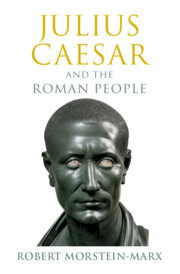Book contents
- Julius Caesar and the Roman People
- Julius Caesar and the Roman People
- Copyright page
- Dedication
- Contents
- Figures
- Acknowledgments
- Abbreviations
- Chapter 1 Introduction
- Chapter 2 The Early Caesar
- Chapter 3 Caesar’s “Entry into History”
- Chapter 4 Caesar’s First Consulship
- Chapter 5 Caesar in Gaul
- Chapter 6 No Return
- Chapter 7 Taking Sides
- Chapter 8 Caesar’s Leniency
- Chapter 9 En Route to the Parthian War
- Chapter 10 Conclusion
- Appendices
- Works Cited
- Select Index of Passages Cited
- General Index
Chapter 4 - Caesar’s First Consulship
Published online by Cambridge University Press: 05 August 2021
- Julius Caesar and the Roman People
- Julius Caesar and the Roman People
- Copyright page
- Dedication
- Contents
- Figures
- Acknowledgments
- Abbreviations
- Chapter 1 Introduction
- Chapter 2 The Early Caesar
- Chapter 3 Caesar’s “Entry into History”
- Chapter 4 Caesar’s First Consulship
- Chapter 5 Caesar in Gaul
- Chapter 6 No Return
- Chapter 7 Taking Sides
- Chapter 8 Caesar’s Leniency
- Chapter 9 En Route to the Parthian War
- Chapter 10 Conclusion
- Appendices
- Works Cited
- Select Index of Passages Cited
- General Index
Summary
Caesar’s tumultuous first consulship in 59 is often regarded as the beginning of the end of the Roman Republic. Yet scholars have been too impressed with Bibulus’s and Cato’s obstructionist tactics, and too ready to concede that they were "correct" from a traditional republican perspective. A common modern perception of the year 59 is that by rejecting Bibulus’s attempted obstruction, Caesar demolished the constitutional constraints on executive and popular power that defined the Republic. But far from representing an established republican constitutional tradition, Bibulus, Cato, and those who followed their lead had pushed the obstructive devices available to them far beyond their customary limits. The notion that Caesar simply imposed his will in the assemblies through violence is also overly simplistic. Nor was the Senate reduced to a "rump" of Caesarian or Pompeian partisans. Caesar’s acta of 59 remained formally valid even while some senators, such as Bibulus himself, continued to try to cast doubt on their legitimacy.
- Type
- Chapter
- Information
- Julius Caesar and the Roman People , pp. 117 - 191Publisher: Cambridge University PressPrint publication year: 2021

